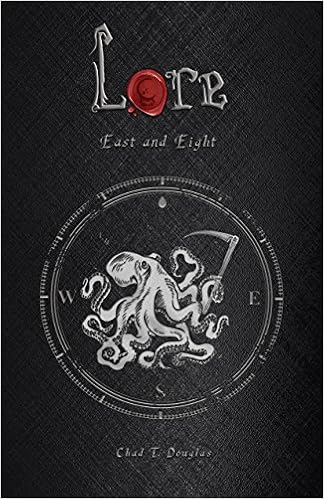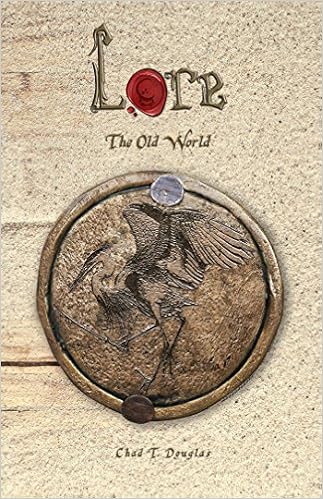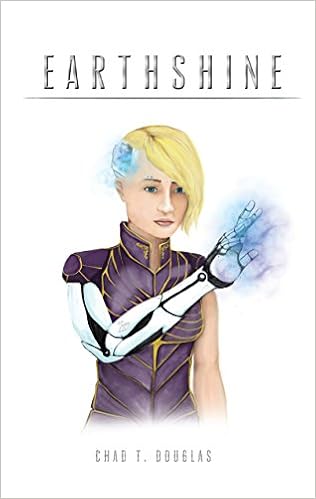______________________
MJN: Your Lore trilogy is described as "surprising
and captivating new take on a familiar and well-explored genre." Vampires,
pirates, werewolves - that's an intricate mix. A good speculative fiction novel
always has the right mixture of natural and supernatural. The two
elements have to be in balance. How do you maintain that balance?
CD: The Lore series is something of a
catch-all for fans of many varieties of contemporary, popular fiction. I've
been told by a few reviewers, interviewers, and readers that any book series
trying to capture so many audiences with a single story immediately sounds too
good to be true, and I'd have to agree in most cases.
The
laundry list of mythical creatures, legends, folklore and fantasy tropes that
can be found in Lore has actually kind of become the series' unofficial tagline
in some regard. I've been going to book festivals for years now, and all day
long I watch people passing my booth. They're turning their heads, checking out
all the sights, and suddenly, they see the big eight-foot banner hanging from
my table. They stop. Whether they're right next to my table or out in the
middle of the street, they stop dead in their tracks. Then, one of two things
will happen. In most cases, they squint, they read (usually I see their lips
actually moving as they do), and they slowly grin and approach the booth,
saying something to the effect of, "Okay, I have to know more about
this." In the other case, once they finish reading, they roll their eyes,
give me a look of absolute skepticism, and walk away. Those types have already
convinced themselves I'm peddling a Harry Potter, Percy Jackson, or Twilight
knock-off, and I'm late to the game. Those who venture in ask me tons of
questions, and I love the looks on their faces when they find out that Lore
does, in fact, deliver on its hefty promises, and in ways they didn't expect at
all.
When
I set out to write the series, just as when I set out to write my newest novel,
Earthshine (science fiction), I took to it in a way that would convince a
reader like myself that the characters, world, and story within might have
actually happened, or could. I love details. When they're handled just right,
they can suspend even the cleverest reader's stubborn sense of disbelief. Now,
not everyone wants the details, and therein lies a challenge--how do you write
convincing fiction while keeping your audience from dozing off? The key, in the
way I write, is to prioritize details by importance, giving the most important
details more spotlight while sprinkling in bits of well fleshed-out details
here and there for support. Anything critical and central to the story deserves
a good, sometimes lengthy explanation, but typically, most readers are fine if
you spare them a thesis on everything else. The foundation has to be solid. I
don't ask my readers to assume much, but I'm also always prepared for questions
about things I simply left out of the book for the sake of good storytelling
economy.
Lore,
for example, includes a number of fictitious journal entries written by one of
the main characters, Geoffrey Mylus. In the journals, the scientifically-minded
Geoffrey keeps notes on everything--werewolf and vampire anatomical studies,
the controversies surrounding global magic trade, the hunting behaviors of
legendary sea creatures, the link between triangular trade and the appearance
of merfolk in the Caribbean...everything. Any time I had to stop and weave
something fictional into factual history, Geoffrey wrote a journal entry. It
helped keep the deeper, more technical backstory compact, and organized it into
optional chunks of story that a reader could take time to peruse, or skip right
over if they chose.
In
summary, I guess my style of balancing comes from loving to be surprised by a
story. A good story has a top layer anyone can love, and deeper content for
those looking to do some more digging. I love nothing more than when a genre I
think I know does something I've never seen it do before, all while doing a great
job of handling the fundamentals. I try to write those kinds of stories.
Finding a story like that is like loving chocolate and finding out someone has
just done something with chocolate you've never tried before. In other words,
blood-sucking doesn't keep vampires alive, new contexts do.
MJN: I love the tasteful,
mysterious, minimalistic covers. They look three-dimensional. I noticed
the combination of rustic and high-tech esthetics.
CD: Thank you! Although writing has become my
hobby and career of choice, I have a fairly extensive background with the
visual arts as well, and I enjoy directing the cover design process. When it
comes time to get book covers done, I'm always incredibly excited and
incredibly stressed. A lot of authors struggle to pick a name for their
characters. Names have to be just right. Well, the same goes for me and my book
covers.
The
Lore series is currently wearing a brand new set of covers, and every last
detail was intentional. Each book's foremost feature is an animal, and each
animal is taken from an important little tale told in the beginning of the
first book. Additionally, each of the animals is surrounded by other images or
materials that have some subtle but critical role in that particular
installment of the story, such as the flowers on the cover of A Pirate's Charm,
the black cloth background of East and Eight, and the old belt buckle on The
Old World.
In
the case of Earthshine, minimalism was key, at least in part. Before I wrote
Earthshine, I had always had a handful of critical scenes in mind. In one of
them, Benni, the protagonist, was in surgery. In her dopey, anesthetized state,
she experiences a bunch of strange sights, sounds, and sensations, and also
appears to be enveloped in a kind of white void. It was a highly symbolic and
downright trippy moment, and that clean, bright, white void is also echoed in a
lot of the popular fashions and architectural styles of the futuristic city
Benni lives in. Additionally, it was meant to make the book look like the
packaging that would be used for a trendy, cutting-edge software manufactured
by Tika, a big tech company in the story. At the same time, Benni herself is
very colorful. She's a student of visual arts and fashion in a world where
everyone is playing a game of keep-up with the fads of the day. The
illustration of her character depicts her in a moment where, for the first time
in her life, she stands out, and for once, it isn't because she chose to. Once
I saw the way she popped against that white background, I decided the cover was
perfect the way it was, and scrapped any plan to develop a more involved
background for the cover.
MJN: With the risk of
sounding like a dirty old woman, you have an extremely alluring headshot.
I imagine you turn many heads when you go to book events. Do you ever
fantasize about having your book adapted as a screenplay and actually playing
one of the male leads?
CD: Haha. You're too kind! And yes, I'd love
to see any or all of my books translated to the big screen, granted they're
given the proper treatment. Actually, one of the reasons I didn't depict any of
the characters in Lore on the covers of the books was because doing so would
have instantly colored in some of the blank spaces in the readers'
imaginations. I've always wondered whether the books would ever even get close
to being popular enough to warrant a screenplay. Still, having some
forethought, I figured I ought not to create a specific look for Thomas Crowe,
Molly Bishop, and the crew, beyond what their textual descriptions already
covered. I didn't want to create a potential headache for some poor soul having
to manage a movie casting and a look-alike contest at the same time.
As
for the remainder of the question, I have thought about being in film
adaptations, but I definitely do not want an important role. I want to be one
of those extras that the film crew sneaks into a shot. I want people who have the
DVD to have their friends on the couch, pausing and replaying the thing,
pointing at the TV going, "Look! Right there! He's one of the werewolves
in the back of the shot, I swear! It's gotta be him." I just think that
would be a much cooler kind of inclusion. I'm a narrator and a writer, but not
an actor, as far as I can tell. I think that distinction is also why I can't
sit at a table in the middle of a restaurant...
MJN: In your biography it
says that you frequent book festivals. Be entirely candid. Are
those events worth attending for small press authors? Do you manage to
traffic many copies that way? Or do you have to be a member of the panel
to get more exposure?
CD: In my experience this is a strongly
debated question, and there are some major factors that affect each author's
answer, most of all just their unique, personal experience with the process of
publishing. When anyone asks me if book festivals or independent publishing
made a difference for me, my answer goes something like this: "Well, if I
hadn't published my first three books myself, I wouldn't be published right
now." From there, the rest of my experience follows much the same
philosophy. Back around 2009, before I really knew what I was doing, I swiftly
got the impression that getting a big publisher's attention wasn't a matter of
twisting their arm; honestly, I felt as though I were going to need some kind
of treasure map, a secret password, and a magic ritual. Well, I'm not the type
who asks permission and patiently waits to be allowed my chance to get started,
so I set up my own press and got to work.
Around
the time I did that, things took off. I started with small signings here and
there around my hometown, the town I went to college in, etc. As a matter of
fact, my second signing, two or so months after I self-published A Pirate's
Charm, landed me my first writing job. I soon began to sign up to exhibit my
books at large festivals all over the state. Now, not all books see the same
degree of success, and I'm sure some of mine is attributable to the audiences I
write for, but I can honestly say that going to festivals, learning to design
attractive booths, being there in person to sign copies, and gradually beating
the introvert out of myself in the process resulted in a satisfying amount of
book sales. A lot of authors I met during that time swore that ebooks were the
way to go, print books were "out", and online marketing (exclusively)
was all any indie author needed. Online marketing and ebooks are great, and
these days I'm a member of the digital crowd, but I still believe in book
festivals, print editions, and showing up in person. I've found that readers
really appreciate the self-starter author who cares enough to show up in
person, stand on their feet for five to eight hours, meet every reader with an
enthusiasm for their questions, and sign books for no extra charge. That said,
I know the natural progression of a successful book, series, or author entails
attending these things less and less, just because the big dogs can't be
everywhere at once, but I can't imagine ever giving it up, no matter how much
success I may see. It's worth it, and I feel like literally going out into the
world to show people something you've made is a rewarding part of the
experience.
MJN: Many sci-fi and
fantasy writers testify that their best work is born out of phobias and
nightmares. Do you have any emotionally disturbing experiences, real or
imagined, that fueled your creative process?
CD: Yes, sometimes that's the case. For me, so
far, this applies much more to Earthshine, my science fiction, than it does to
Lore. Earthshine is, at its core, my (frustrated) creative response to a lot of
anxiety I began to feel around the time I was in college. It's the product of a
lot of nagging realities that affected me and others, friends and the like, as
we grew into independent adults, anticipating what awaited us beyond college in
a world that seems to love collecting, creating, and wallowing in complicated issues.
During that time, I began to see a lot of things going on in the
background--little, quiet problems that either no one has noticed yet, or
problems that seem inevitable, but don't yet exist. In short, I did a lot of
looking down the road and worrying about what distant things might be
approaching, and of course, speculative fiction seemed to be the way to go
about discussing those worries. The most frightening thing Earthshine
expresses, I think, is that it's not some story about good people living in a
dystopian society run by bad people. It's a story about how flawed people don't
hold themselves accountable for the bad societies they create for
themselves.
A
lot of writing, in my experience, is the process of gathering all of my deeper
thoughts, especially those produced by less-than-cheery thoughts and
realizations, giving them an organized context, making something meaningful out
of them, presenting them to strangers, and seeing whether anyone relates. The
goal, and this is important, is not primarily to try and create a message or a
moral or anything like that. I'm much more interested in producing a feeling in
the reader that feels universal, but is also hard to pin down. I like trying to
tell a story in a way that motivates the reader to get some mental and
emotional exercise, and leaves them trying to figure out why what they read
made them feel what they felt. When I can get them to feel what I say and not
just hear or see what I say--to share in the things that make me laugh, the
things that anger and depress me, and the things that inspire me--I think
that's when I've done a good job.





No comments:
Post a Comment